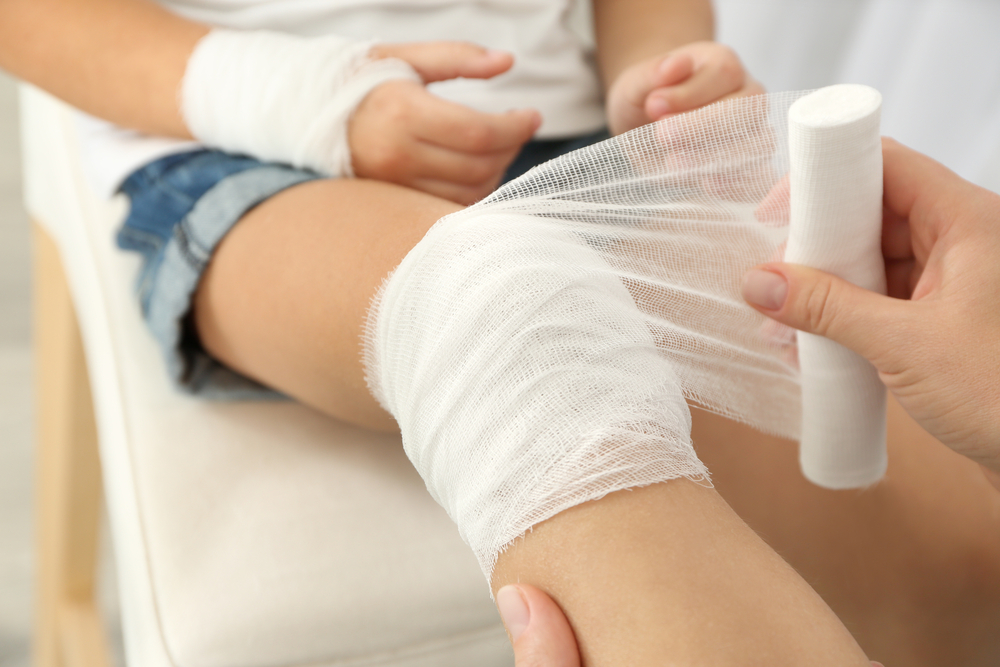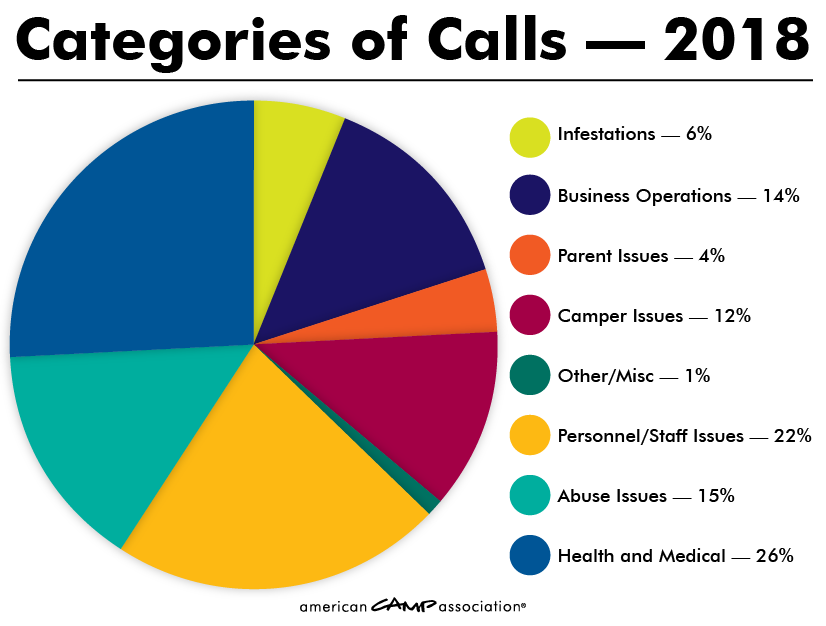
AfricaStudio/Shutterstock
.
Camps and other youth programs are fun, dynamic and fast-paced places, which is part of the reason youth thrive in these settings. But these and other features of typical camps can also be a recipe for disaster, despite our best risk management efforts. The American Camp Association’s Camp Crisis Hotline is a free, confidential, year-round service for camp and other youth program professionals to use when they face an emergency or crisis.

Laurie Browne
The hotline is staffed by ACA professionals who are trained to listen and facilitate dialogue with the caller about the nature of the emergency. We are not legal experts or licensed health care professionals, but often advise callers to seek the support of those trained to give legal or medical advice. Most often, the camp professionals who call the Crisis Hotline have these resources available as a part of their emergency plan or general policies and procedures; they just need a calm voice on the line to walk them through their own documentation. We often direct callers to resources on our hotline webpage and, in some situations, recommend they seek additional resources from their insurance provider.
Tracking hotline calls helps ACA identify emerging trends and crisis-related topics for which camp professionals might need resources, training and other forms of support. We receive about 125 calls each year, mostly during the summer months, and track each call by topic area. Here is the breakdown of calls from 2018, followed by some examples of calls in the three top categories:
Health and Medical Emergencies
Just over a quarter of the calls we received were related to health and medical emergencies. Historically, this includes issues such as contagious illness, infestation such as bedbugs or lice, and accidents resulting in injury. On the rise this year were calls related to mental health emergencies among campers and staff, and calls related to medication and medication management.
Lessons learned about health and medical emergencies:
- Trained health care staff is critical to the health and well-being of your campers and staff. The Association of Camp Nursing provides excellent resources and training for camp health care staff, as well as ACA’s webpage dedicated to health and wellness resources.
- Distributing medication can be tricky and is more important now than in the past. As more people bring prescription medication to camp, and more camps want to provide “out of camp” adventure experiences (such as overnights away from camp), the issues related to the distribution of medication become complex.
- Campers and staff need mental health support. The number of calls to the hotline on this topic appears to mirror a societal trend. Camps need to have a mental health support system in place and should add mental health resources and experts to the team and health care plan.
- Create a communications plan before any crisis happens. Crises and emergencies can mean heightened emotions and foggy thinking, and controlling the information you share with campers, staff, parents and the media is critical.
Emergencies Related to Abuse
Every year a percentage of our hotline calls are about abuse, either a camper disclosing abuse that happened outside of camp, camper-to-camper abuse at camp and sometimes abuse by a staff member on site. These are difficult calls to process because, most often, the camp providers have done everything they are supposed to do to prevent abuse from happening on site, but still these emergencies happen. What appears to be on the rise from previous years is incidents involving campers disclosing situations of abuse at home and camper-to-camper abuse.
Lessons learned about emergencies related to abuse:
- The law is clear. You MUST contact authorities if there is an allegation of abuse. All camps fall into the category of a mandated reporter. While state laws vary, camp professionals generally serve in loco parentis (in place of the parent) and must call the proper authorities in their state when allegations of abuse are revealed. It does not matter whether the allegation is that the abuse occurred at camp by another camper, by a staff member or at home.
- Don’t try to investigate. It is critical that you contact the authorities promptly so experts who are trained on these issues can begin their processes immediately. Resist the temptation to start your own “investigation” prior to contacting the authorities, even if you think it is possible that the child is “making it up.” The camp should rely on the legal authorities to step in and take over the matter.
- Don’t be surprised when a child reveals an allegation of abuse at home. It has been our experience that children who are the victims of abuse or neglect at home (or some other place outside of camp), once experiencing the safe environment of camp, can sometimes — for the first time — reveal their abusive situation to a caring adult at camp.
- See something, say something — teach your staff and campers to be ever vigilant and question what they see. It takes just one person to step up and question when they see something not right about the way an adult is interacting with a child. You may be the one who is able to free a child from serial abuse. Always have the best interest of the child in mind!
- One staff person should never be alone (out of the sight of others) with a camper. Period. If nursing/health care staff are concerned about the privacy of a camper when they are being medically examined, be sure you have established procedures that still avoid a situation where a staff person could abuse (or be accused of abusing) a child. Your staff training and supervision policies must support this principle.
- Establish clear policies about appropriate physical interaction between staff and campers. Be very clear where you draw the line. Does your camp allow hugging, back-patting, lap-sitting, etc.? If so, be sure that your staff understands what is appropriate and what is not. Use role-playing in staff training to crystalize your policies.
Emergencies related to staff and personnel
This is a broad category that includes health and medical issues related to staff and sometimes allegations of abuse if the allegation is between staff. We saw an increase in the number of hotline calls related to staff or personnel this year, largely in the category of staff mental health. Working at camp or in any youth program can be stressful and exhausting and the frontline staff we hire might not know how to recognize the signs of fatigue and seek appropriate self-care before an emergency happens.
We also saw some examples of the “Me Too” movement at camp when callers described situations of a staff member accusing another staff member of sexual assault. While the procedures for addressing these accusations are well-established in most workplaces, what was challenging for camps was the way an accusation affected their tight-knit camp staff community. We learned that controlling the spread of information is critical to addressing the accusation and protecting the privacy of the individuals involved.
Lessons learned about personnel/staff issues:
- Set and enforce clear policies about acceptable relationships between staff while at camp. Numerous callers wanted to discuss sexual relationships between staff including consensual as well as allegations of force. Understand that where adults are concerned, if an allegation of force is made that is a police matter, and the alleged victim should contact the authorities. Don’t hesitate to contact an employment attorney any time issues of assault come up.
- Enforce your personnel policies. It’s not enough to simply have personnel policies — you must share, review and enforce them as well. Establish a clear understanding of what the consequences are (reprimand, suspension, dismissal and so on) for the violation of the policies. If you don’t enforce your own policies, you leave yourself open to a variety of risks — including lawsuits — especially if you do not enforce consistently (i.e., treating one staff member differently from another when they have both ignored one of your policies).
- Have a back-up plan for staff coverage in an emergency or unexpected loss of staff. Supervision ratios are critical to ensuring the safety of your campers. What will you do if you have a policy against alcohol on property and you catch numerous staff drinking? Before the season begins, identify short-term options that you can turn to for staff coverage in an emergency.
- Take any threat of suicide very seriously. Suicide threats are a serious mental health issue. It is imperative to seek the help of mental health professionals and get the necessary help for the staff member.
It goes without saying that regular and thoughtful emergency action planning is critical to preventing crises and ensuring maximum safety if they occur. Many of the camps we work with are considering new scenarios that they have not considered in the past, such as active shooter situations and extreme weather events or wildfire.
Thinking through even the most implausible scenarios ahead of time will not only give you the tools you need when an emergency arises, but will give you, your staff and your parents confidence in your program. Check out ACA’s Camp Crisis Hotline page for an extensive list of resources, reviews of calls and staff training scenarios, and the free, confidential number to call any time, day or night, if your program faces a crisis or emergency situation.
Laurie Browne, Ph.D., is the director of research at the American Camp Association, where her primary responsibilities include translating research to practice and engaging camps in meaningful evaluation. She is a former day camp director and currently lives in Salt Lake City with her family.
































